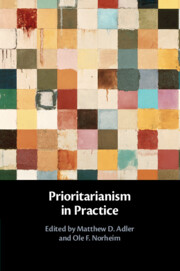Book contents
- Prioritarianism in Practice
- Prioritarianism in Practice
- Copyright page
- Contents
- Figures
- Tables
- List of Contributors
- 1 Introduction
- 2 Theory of Prioritarianism
- 3 Well-Being Measurement
- 4 Prioritarianism and Optimal Taxation
- 5 Prioritarianism and Measuring Social Progress
- 6 Prioritarianism and Health Policy
- 7 Prioritarianism and Fatality Risk Regulation
- 8 Prioritarianism and Climate Change
- 9 Prioritarianism and Education
- 10 Empirical Research on Ethical Preferences: How Popular is Prioritarianism?
- 11 Prioritarianism and Equality of Opportunity
- 12 Prioritarianism and the COVID-19 Pandemic
- Index
- References
2 - Theory of Prioritarianism
Published online by Cambridge University Press: 09 June 2022
- Prioritarianism in Practice
- Prioritarianism in Practice
- Copyright page
- Contents
- Figures
- Tables
- List of Contributors
- 1 Introduction
- 2 Theory of Prioritarianism
- 3 Well-Being Measurement
- 4 Prioritarianism and Optimal Taxation
- 5 Prioritarianism and Measuring Social Progress
- 6 Prioritarianism and Health Policy
- 7 Prioritarianism and Fatality Risk Regulation
- 8 Prioritarianism and Climate Change
- 9 Prioritarianism and Education
- 10 Empirical Research on Ethical Preferences: How Popular is Prioritarianism?
- 11 Prioritarianism and Equality of Opportunity
- 12 Prioritarianism and the COVID-19 Pandemic
- Index
- References
Summary
This chapter provides theoretical foundations for the Prioritarianism in Practice volume, by clarifying the features of prioritarian social welfare functions (SWFs). A prioritarian SWF sums up individuals’ well-being numbers plugged into a strictly increasing and strictly increasing transformation function. Prioritarian SWFs, like the utilitarian SWF, fall within the “generalized-utilitarian” class of SWFs.Generalized-utilitarian SWFs are additive and, hence, especially tractable for purposes of policy analysis.The chapter reviews the axiomatic properties of generalized-utilitarian SWFs and, specifically, of prioritarian SWFs. Prioritarianism satisfies the Pigou-Dalton axiom (a pure, gap-diminishing transfer of well-being from a better-off to a worse-off person is an ethical improvement), while utilitarianism does not. Pigou-Dalton is the axiomatic expression of the fact that a prioritarian SWF gives extra weight (priority) to well-being changes affecting worse-off individuals. The chapter also discusses the informational requirements of prioritarian SWFs (as regards interpersonal well-being comparisons).It reviews the various methodologies for applying a prioritarian SWF under uncertainty. And it describes the two main subfamilies of prioritarian SWFs, namely Atkinson and Kolm-Pollak SWFs.
Keywords
- Type
- Chapter
- Information
- Prioritarianism in Practice , pp. 37 - 127Publisher: Cambridge University PressPrint publication year: 2022
References
- 5
- Cited by



